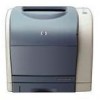HP 2500 HP Color LaserJet 2500 series - User Guide - Page 54
Manual Options, Manual, Halftone options, Smooth, Detail, Neutral Grays, Black Only, Color
 |
View all HP 2500 manuals
Add to My Manuals
Save this manual to your list of manuals |
Page 54 highlights
Manual Options If you select Manual, you can individually adjust the Halftoning, Neutral Grays, Edge Control, and RGB Color options for each of the major elements: text, graphics, and photographs. Halftone options Halftone options affect the resolution and clarity of your color output. You can independently adjust halftone settings for text, graphics, and photos. The two halftone options are Smooth and Detail. If your program converts text and graphics to raster, the Photographic settings will also control text and graphics. q Smooth provides better results for large, solid-filled print areas. It also enhances photos by smoothing out fine color gradations. Choose this option when uniform and smooth area fills are the most important attributes. q Detail is useful for text and graphics that require sharp distinctions among lines or colors, or images that contain a pattern or a high level of detail. Choose this option when sharp edges and details are the most important attributes. Neutral Grays Neutral Grays determines the method for creating neutral gray colors. If your program converts text and graphics to raster, the Photographic settings will also control text and graphics. q Black Only generates neutral colors (grays and black) using only black toner. This option guarantees that neutral colors do not have a color cast. q 4-Color generates neutral colors by combining all four colors of toner. This option produces smoother gradients and transitions to non-neutral colors. It also produces the darkest possible black. Edge Control This option determines how edges are rendered. Edge Control consists of two components: Adaptive Halftoning and Trapping. Adaptive Halftoning increases the edge sharpness. Trapping reduces the effect of color plane misregistration by slightly overlapping the edges of adjacent objects. q Maximum provides the most trapping. Adaptive Halftoning is set to On. q Normal provides the default trapping settings. Adaptive Halftoning is set to On. q Light provides minimal trapping. Adaptive Halftoning is set to On. q Off sets Trapping and Adaptive Halftoning to Off. RGB Color This option determines how colors are rendered. q Default interprets RGB color as sRGB, which is the accepted standard for many software companies and organizations, such as Microsoft and the World Wide Web Consortium. q Device sets the printer to print RGB data in raw device mode. To render photographs properly when this option is selected, you must manage color in the program in which you are working or in the operating system. 52 Printing tasks ENWW















